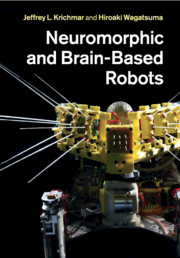Book contents
- Frontmatter
- Contents
- Contributors
- Preface
- Part I Introduction
- Part II Neuromorphic robots: biologically and neurally inspired designs
- Part III Brain-based robots: architectures and approaches
- Part IV Philosophical and theoretical considerations
- Part V Ethical considerations
- 14 Ethical implications of intelligent robots
- 15 Toward robot ethics through the ethics of autism
- Index
- References
15 - Toward robot ethics through the ethics of autism
from Part V - Ethical considerations
Published online by Cambridge University Press: 05 February 2012
- Frontmatter
- Contents
- Contributors
- Preface
- Part I Introduction
- Part II Neuromorphic robots: biologically and neurally inspired designs
- Part III Brain-based robots: architectures and approaches
- Part IV Philosophical and theoretical considerations
- Part V Ethical considerations
- 14 Ethical implications of intelligent robots
- 15 Toward robot ethics through the ethics of autism
- Index
- References
Summary
Why must autonomous robots be moral?
What does autonomy mean for robots?
The aim of this chapter is to present an ethical landscape for humans and autonomous robots in the future of a physicalistic world, and which will touch mainly on a framework of robot ethics rather than the concrete ethical problems possibly caused by recent robot technologies. It might be difficult to find sufficient answers to such ethical problems as those occurring with future military robots unless we understand what autonomy in autonomous robots exactly implies for robot ethics. This chapter presupposes that this “autonomy” should be understood as “being able to make intentional decisions from the internal state, and to doubt and reject any rule,” a definition which requires robots to have at least a minimal folk psychology in terms of desire and belief. And if any agent has a minimal folk psychology, we would have to say that it potentially has the same “right and duties” as we humans with a fully fledged folk psychology, because ethics for us would cover any agent as far as it is regarded to have a folk psychology – even in Daniel C. Dennett’s intentional stance (Dennett, 1987). We can see the lack of autonomy in this sense in the famous Asimov’s laws (Asimov, 2000) cited by Bekey et al. in Chapter 14 of this volume, which could be interpreted to show the rules any autonomous robots in the future have to obey (see Section 14.3).
Information
- Type
- Chapter
- Information
- Neuromorphic and Brain-Based Robots , pp. 345 - 361Publisher: Cambridge University PressPrint publication year: 2011
References
Accessibility standard: Unknown
Why this information is here
This section outlines the accessibility features of this content - including support for screen readers, full keyboard navigation and high-contrast display options. This may not be relevant for you.Accessibility Information
- 1
- Cited by
